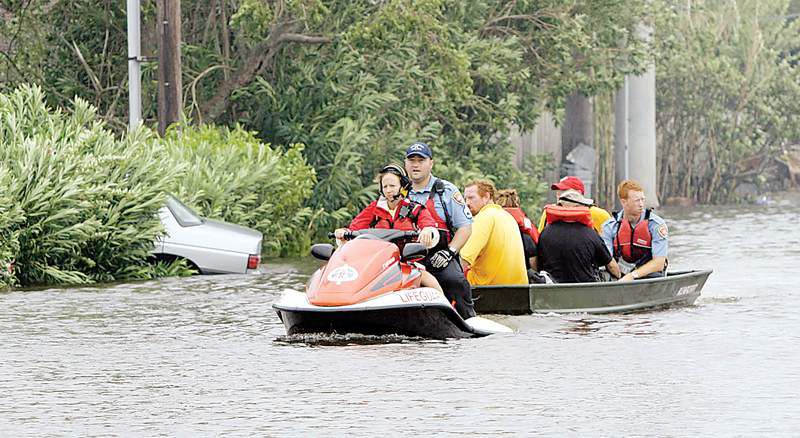Ike”s wake: Power out, thousands stranded
Published 5:00 am Sunday, September 14, 2008

- Rescue crews pull in stranded residents from a flooded neighborhood in Galveston, Texas, on Saturday after Hurricane Ike hit the Texas coast. Using high-wheeled trucks, helicopters and boats, the rescuers ventured out to pluck people from their homes in an all-out search for thousands of Texans who stayed behind overnight despite mandatory evacuation orders. “Today, we’re focused on the search-and-rescue aspect,” Gov. Rick Perry said.
HOUSTON — Hurricane Ike barreled across a wide swath of Texas on Saturday, deluging the city of Galveston with an 11-foot-high wall of water and leaving extensive damage across metropolitan Houston.
Longtime residents of Galveston, a city of 57,000, said the damage was the worst they had ever seen. After early difficulties with flooding and debris in the streets, officials were deploying firefighters across the city for rescue efforts. Three serious injuries were reported from a fire that broke out in a Houston restaurant, and a woman died after a tree fell on her home in Pinehurst, northwest of Houston.
And more than 3 million customers in Texas were without power. Thousands more lost power in Louisiana, which was spared a direct hit from the storm.
A million people evacuated coastal areas before the storm struck, but the authorities estimated that more than 100,000 people throughout the region, including 20,000 in Galveston, had disregarded mandatory evacuation orders.
At least 100,000 homes were inundated by surging waters, while isolated fires broke out around the region when trees and flying objects fell on electrical transformers, causing sparks. President Bush declared a major disaster in 29 Texas counties and 10 Louisiana parishes, and ordered immediate federal aid.
But by evening, it appeared that Ike was not the single calamitous stroke that forecasters had feared. The full extent of the damage — or even a rough sense of how many people may have perished — was still unclear, however, in part because many roads were impassable.
Some authorities feared that this could instead become a slow-motion disaster, with thousands of victims trapped in their homes, waiting for days to be rescued.
“We will be doing this probably for the next week or more. We hope it doesn’t turn into a recovery,” said Sheriff’s Sgt. Dennis Marlow in Orange County, where 600 to 700 people had to be rescued from flooded homes. He said hundreds were probably still stranded.
Since Ike made landfall, there have been 940 rescues in Texas of people stranded in homes, vehicles and elsewhere, said Gov. Rick Perry’s spokeswoman Allison Castle. In Louisiana, Gov. Bobby Jindal said nearly 600 people were plucked from Ike’s floodwaters since Friday, and that search and rescue teams believe the largest number of rescues was behind them.
After the storm had passed, National Guardsmen, members of the Coast Guard, FEMA crews, and state and local law enforcement authorities mobilized for what Perry pronounced “the largest search-and-rescue operation in the history of the state of Texas.”
Some emergency officials were angry and frustrated that so many people ignored the warnings.
“When you stay behind in the face of a warning, not only do you jeopardize yourself, you put the first responders at risk as well,” Homeland Security Secretary Michael Chertoff said. “Now, we’re going to see this play out.”
Mayor Bill White, of Houston, said on local television: “This is going to be a time of testing. This is a time for neighbors to help neighbors. I’m encouraging people to show the nation and ourselves just how competent we are.”
Because Ike was so huge — some 500 miles across, making it nearly as big as Texas itself — hurricane winds pounded the coast for hours before and after the storm’s center came ashore. Ike soon weakened to a tropical storm as it made its way inland, but continued to pound the state with 60 mph winds and rain. Downgraded to a tropical storm Saturday, Ike moved inland, taking the threat of tornadoes and heavy rains with it, the National Hurricane Center in Miami said.






